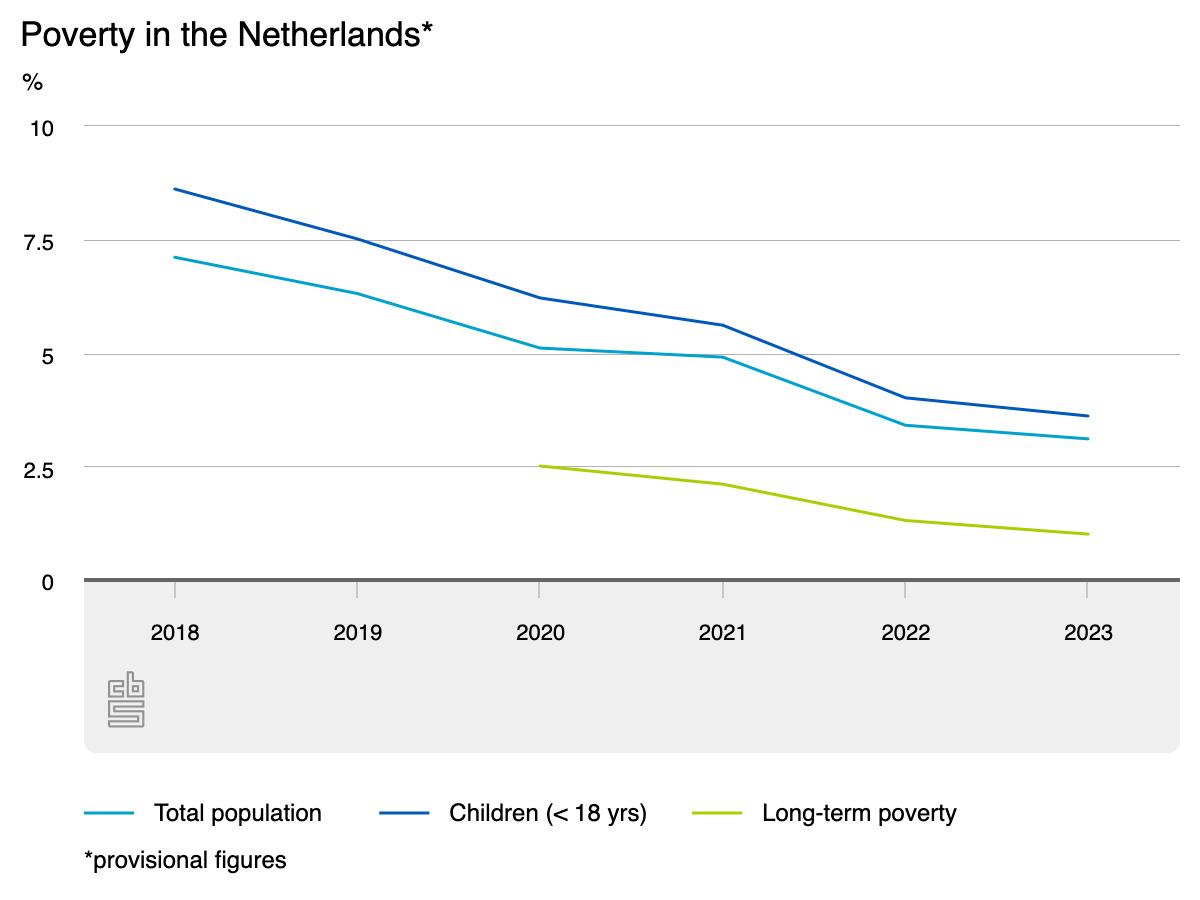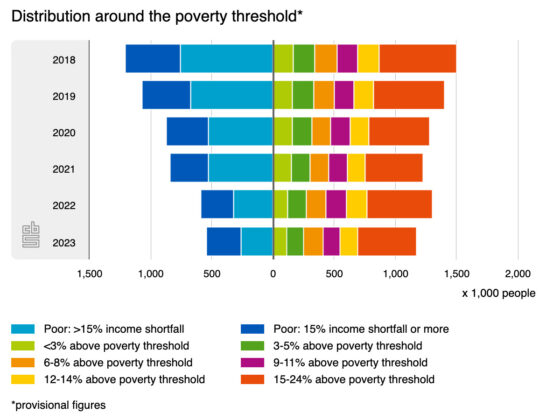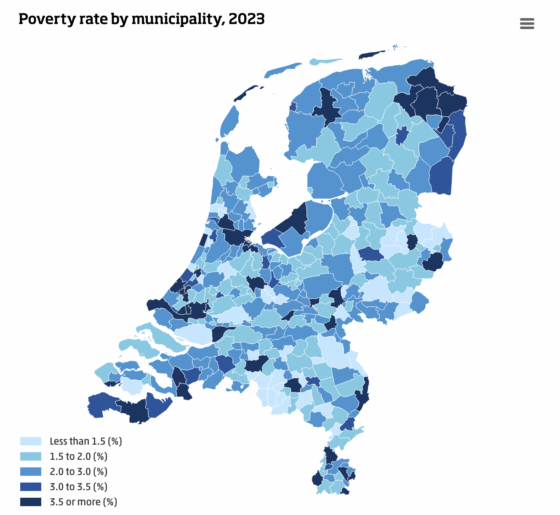What’s all the fuss about poverty in the Netherlands?
Louis Gore Langton
The richest Dutch are getting richer, adding 5% to their wealth last year, according to the latest edition of the Quote 500 rich list. The Netherlands may be one of the most prosperous countries in the world, but some 3.1% of the population, or 540,000 people, are still classified as poor.
Over a million are living just above the official poverty line, often with no savings or buffer assets. Over 100,000 people rely on food banks every week, and experts say several hundred thousand more – at least – qualify for help but are either scared of the authorities or simply ashamed to ask.
So what’s the truth about poverty in the Netherlands?
The new definition
The way poverty in the Netherlands is defined and measured recently came under a new official set of parameters, developed by the CBS, the Netherlands Institute for Social Research (SCP) and the family spending institute Nibud.
Previously, income was the benchmark used against expenditure to determine who lived below the poverty line. Under the new method, savings and other immediately usable assets are also counted.
The new calculations are based on 35 different family set-ups. They suggest a single person needs an income of €1,510 per month, if their rent is €590 and they spend €145 on energy. A couple with two children are considered poor if their income is less than €2,535 a month and their children are under the age of 12 and €2,910 if they are teenagers. A single parent family with two teenagers needs €2,500.
The figures are based on how much people need to be able to pay for their daily needs, including access to the internet, a phone, going on holiday, joining clubs and other social activities.
Numbers and historical trends
In 2018, 7.1% of the population was defined as living in poverty. Poverty fell in 2019, partly due to wage increases and it fell further in 2020 due to support provided during the Covid-19 pandemic. It also fell in 2022 and 2023, mainly as a result of measures to compensate people for higher energy prices, and measures to boost purchasing power, such as an increase in the minimum wage.
The new definition has cut the number of people who are officially classed as poor even further. However, according to poverty action foundation ArmoedeFonds, more than half of Dutch aid organisations it follows (over 1,100) have seen an increase in the number of people seeking assistance in the last year.
The group has also noticed a growing number of children requesting basic school supplies, such as backpacks, notebooks, and calculators.
“For the Armoedefonds, the most crucial aspect of any poverty definition is that it ensures people have enough financial resources to cover basic needs such as food, personal care products, housing, and healthcare, while also being able to fully participate in society,” a spokeswoman told Dutch News. “For instance, every child should have the opportunity to engage in activities like sports.”

Are people in big cities poorer?
Yes. Only 13% of the population lives in big cities, but the cities contain 24% of poor households. Amsterdam has the highest poverty rate and 6.6% of the population are considered poor.
The Limburg town of Vaals (6.4%), Rotterdam (6.2%), The Hague (6.1%), and Vlieland (6%), where residents often do seasonal work, make up the top five.
Are immigrants at greater risk?
Yes. Children born abroad are at higher risk of poverty and almost 19% of them will be officially classed as poor. Second generation children also have a higher than average risk (10.8%). For children born in the Netherlands and both of whose parents were also born here, the risk is only 2.5%
First and second generation refugee children are also far more likely to be poor. Almost half of Syrians are classified as poor, as are 40% of those from Afghanistan and 41% of those from Eritrea.
Turkish, Moroccan, Surinamese and Dutch-Caribbean immigrants and second generation children traditionally form the largest groups with a non-European background in the Netherlands. Children born in Morocco (41.9%) or Turkey (31.8%) had the highest risk of poverty but this figure goes down sharply with the next generation as people move up the social scale.

Inequality
The Netherlands is both one of the world’s most equal and unequal countries. Measured by income, the country has the fifth lowest inequality rate in the EU. Income disparities have remained mostly static since the mid 1970s, and the councils with the biggest gaps between rich and poor are again the big cities.
When measured by overall wealth, however, the Netherlands is one of the most unequal countries on earth. In 2020, a European Commission backed study found that only the US was more unequal in terms of overall wealth, and said that the statistics are driven by debt, and that the coefficient is elevated by the number of Dutch households with high mortgages.
The working poor
When publishing its new definition of poverty last month, the CBS was quick to point out that a large number of people living below what officials consider necessary were actually in work.
“Working people are often more short of income than poor people living on benefits,” said CBS chief economist Peter Hein van Mulligen. “Compared with 2018, there were relatively more working poor than people living on welfare benefits.”
This is partly down to the prevalence of part time working, and the fact that supplementary benefits are income dependent, which can discourage people from working longer hours.
The Dutch minimum wage is currently €13.68 an hour for everyone over the age of 20, which works out at roughly €28,454 a year for a 36 hour week.
So what about benefits?
From July 2024 the basic welfare payment for a single person amounts to €1,308.45 a month, and €1,869.21 for a couple. You can have up to €7,575 in assets as a single person and double that if there are two of you, before the basic benefit is cut.
On top of that you can claim up to €123 a month in healthcare benefits, depending on your income and help with paying your rent, but only if you live in a rent controlled property. Again, both these benefits depend on how much you have in assets.
Families with children get additional child benefits and help with paying for daycare. Some local authorities also provide extra help. The very poorest residents may be exempt from paying local authority taxes, for example, or be eligible for extra financial support.
Food banks
A report compiled by the Red Cross earlier this year found that one in seven people in the Netherlands go short of food or lack a balanced diet, with most of them blaming a lack of money.
Today, there are 178 food bank foundations in the Netherlands operating under Voedselbank, the national federation, which works through 550 distribution points all over the country.
Last year the agency helped over 100,000 families a week, and another 300,000 could qualify for help but don’t receive it. To qualify, people have to prove their income, their costs and any debts they may have.
“People wrongly think that we’re a government organisation, and they are afraid of the government,” says deputy chairman Tom Hillemans. “Many people also do not have access to, or do not know how to use digital registrations and so need help accessing services.”
There are also dozens of other independent operations which are community or church based.
Government strategy
One of the key issues in last year’s Dutch general election was bestaanszekerheid, one of those impossible to translate words which means roughly socio-economic security.
Political parties from across the party spectrum promised increases in the minimum wage, lower taxes and major efforts to combat poverty. Bestaanszekerheid became was a key issue in the formation process, which saw the Netherlands get a right-wing cabinet including the far-right PVV.
Since then, however, many of the promises have been watered down. The impact of September’s budget, ministers admitted, would be a minor increase of less than 1% in spending power for the very poorest in society. Moves to increase the minimum wage by a fraction more, were quietly shelved.
Thank you for donating to DutchNews.nl.
We could not provide the Dutch News service, and keep it free of charge, without the generous support of our readers. Your donations allow us to report on issues you tell us matter, and provide you with a summary of the most important Dutch news each day.
Make a donation